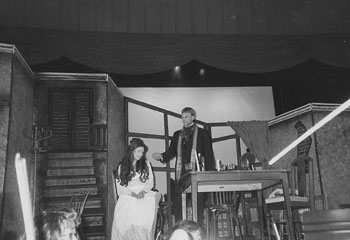Everyday Intimacy
Bay Shore Lyric Opera plumbs Puccini's 'La Bohème' for all its dramatic impact
By Michael J. Vaughan
IN PULLING A REPRISE of its debut production a mere 18 months after its debut, Capitola's Bay Shore Lyric Opera makes a good argument for the progress it has made thus far. Bay Shore's production of Puccini's La Bohème displays marked improvements in matters of stagecraft, musicality and evenness of talent, allowing the production itself to reach new levels of dramatic intensity. In other words, bring extra hankies.
La Bohème is about as close as you can get to a perfect opera. It stands up remarkably well to repeated viewings--and, in fact, reveals new treasures each new time out. This staying power could as well be attributed to its everyday intimacy--Puccini can take a cafe squabble and turn it into a cantata--as to the subtle, sublime lyricism of its music.
And the best music comes early. After clowning around with his starving-artist roommates (the setting was inspired by Henry Murger's novel Scenes From the Lives of the Bohemians, as well as Puccini's own youthful struggles in Milan), the poet Rodolfo is interrupted in his work by a sickly, beautiful young neighbor, Mimi. Their immediate chemistry sparks off the most melodious set of introductions in opera: Rodolfo's "Che gelida manina," Mimi's response, "Mi chiamano Mimi," and the rapturous duet, "O soave fanciulla." If anybody were actually going to fall in love in 15 minutes, this is the music that would do it.
The top notes in "Che gelida" proved a bit of an overmatch for tenor Delmar McComb, but he seemed to make a damn-the-torpedoes adjustment midway and attacked the final high C with fresh vigor. His rather by-the-numbers phrasing, however, suffered in contrast with soprano Jennifer Der Torossian's more luxurious, conversational take on "Mi chiamano." (It didn't help matters that Anthony Quartuccio's orchestra was having trouble matching either tempo, especially in the between-phrase interludes of the principal strings.)
In any case, McComb gathered force during the evening--notably in his Act III confessional to painter-pal Marcello, and especially in the final death scene--and the orchestra smoothed out nicely. The Act II cafe scene brought out a robust chorus, the stage-sure presence of baritone Todd Donovan as Marcello, and soprano Erina Anne Newkirk's sparkling reading of Musetta's Waltz, which finished off with a creamy-smooth decrescendo on its final note.
As for the prima donna, Der Torossian's singing continues to be a garden of vocal delights and the main reason for those hankies. If her tormented portrayal of Mimi's physical degeneration doesn't do it to you, then the expansive quality of her lower range will. Those low, sobbing notes, used by Puccini to convey thoughts of death, seem at times to be directly connected to one's lachrymal glands.
Over all, this La Bohème exhibits far greater dramatic solidity than Bay Shore's first version in March 1997, thanks largely to the higher quality of the second-tier performers (Juan Lozano Sanchez's Colline, Benito Galindo's Schaunard, Robert Schaffer's Benoit), the continuing influence of stage director Lin White (who did such a fine job with last spring's Rigoletto), and--minus a wobbly Act III archway--steady polishing in matters of set, lighting and chorus work.
(Final listener's note: Check out the weird acoustics when characters sing from the backstage area. That's no backstage mic you're hearing but the amazing resonating abilities of the Capitola Theater's concrete sidewalls. Catch a powerful soprano off them and you might just wind up with tinnitus.)
Copyright © Metro Publishing Inc. Maintained by Boulevards New Media.
![]()

Young Love: Mimi and Rodolfo are opera's favorite couple.
La Bohème, presented by Bay Shore Lyric Opera, plays Fri-Sat at 8pm, Sun at 3pm through Nov. 14 at the Capitola Theater, 120 Monterey Ave. Tickets cost $20-$25. (831/462-3131)
From the October 22-28, 1998 issue of Metro Santa Cruz.
![[MetroActive Stage]](/stage/gifs/stage468.gif)